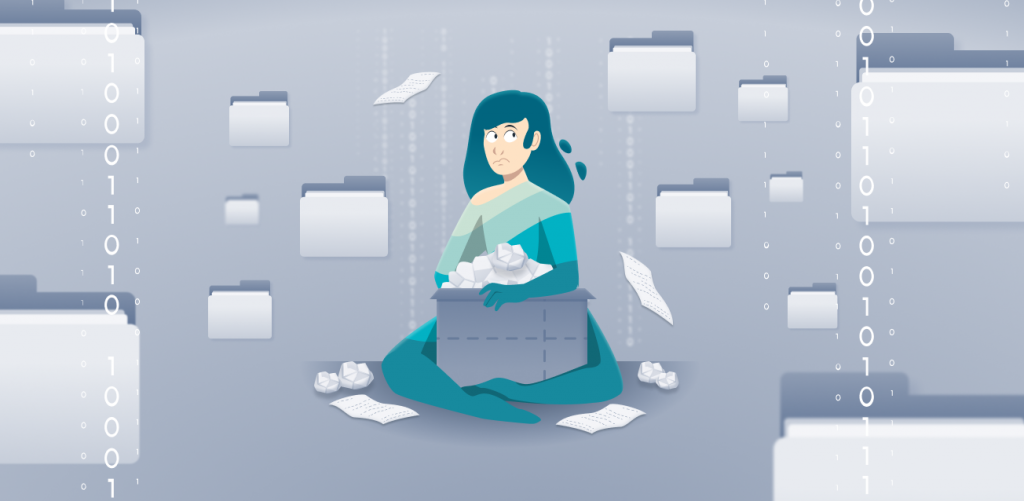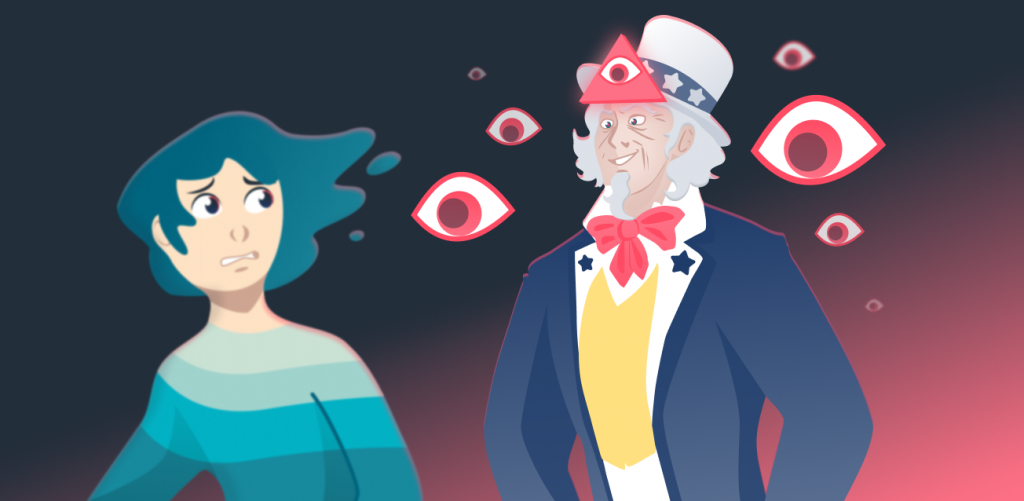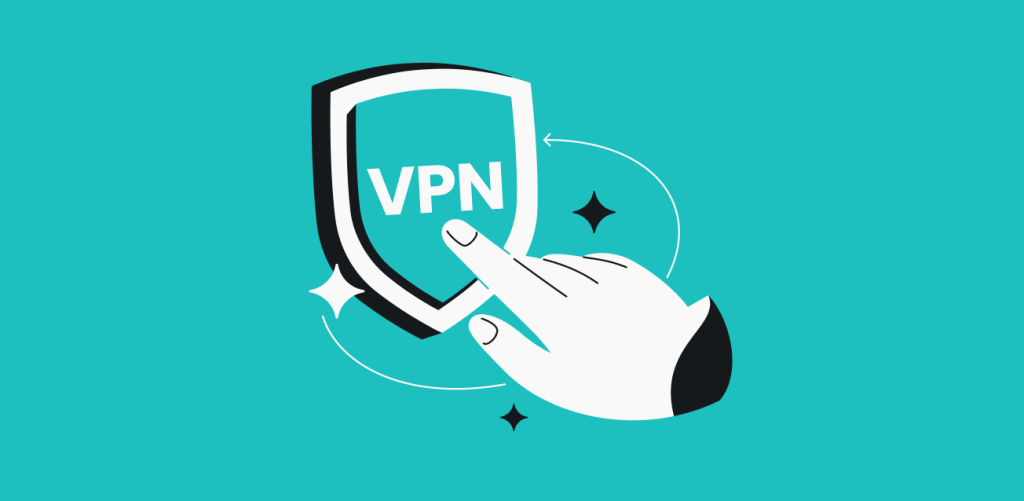
Does your document folder give you similar vibes to your attic, but instead of childhood relics and dust clogging your nostrils, it’s cluttered with mysterious files?
If so, you might be suffering from data hoarding (a.k.a. digital hoarding). Let’s explore what data hoarding is and how it can affect your life.
Data hoarding in under 30 seconds
Data hoarding is not so different from physical hoarding, in which collecting stuff becomes a compulsion. Hoarding physical items can clutter your personal space, perhaps to the point where your living conditions get difficult.
Data hoarding is about archiving or never deleting electronic data. However, there’s a fine line between hoarding and collecting. If you have a hard time getting rid of digital clutter or your mind screams “NO!” any time your finger hovers over that delete button, there may be a problem.
Data hoarding can go fairly unnoticed too. After all, it’s much easier to mindlessly cram files into a separate folder than to have a bunch of stuff lying around your flat. It may not seem much of a problem at first.
However, e-hoarding can still interfere with your quality of life as an individual or even impact the capacity to run an efficient business.
What is individual data hoarding?
Individual data hoarding happens when a person obsessively collects files, and may feel anxious or afraid about deleting them.
What’s the difference between being bogged down by too many emails in your inbox, kept “just-in-case,” versus full-on cyber hoarding?
Well, individual data hoarding emphasizes access to data, not just at any time or anywhere, but forever.
As one Reddit Community member explains, “None of it will ever go anywhere… I never have to worry about waking up one morning and finding three seasons of some show disappeared due to a contract expiring somewhere. It’s just there, the content is curated, it works perfect [sic], and it always will.”
While the merits of this Redditor accessing all 52 episodes of Samurai Pizza Cats (literally until the end of time) are debatable, anxiety about what would happen if data disappears is consistent with data hoarding behavior.
/r/DataHoarder/ has existed since 2013 and has 554k members.
Their motto is, “What do you mean, delete?”
[Screenshot of DataHoarder’s community descriptions via /r/DataHoarder/]
What is organizational data hoarding?
Organizational data hoarding happens when companies collect and keep large amounts of useless data, and refuse to delete it.
Just like physical hoarding can become a problem, businesses that e-hoard can also turn dysfunctional. They can become less efficient and put their comapny’s and users’ data at unnecessary risk.
For example, failing to purge large amounts of unused data (a.k.a. dark data) can make any security breaches much worse.
Whether the data is old emails, images, or employee correspondence, companies still need to make it compliant with data privacy laws.
In a 2016 report by Veritas Data Genomics, 83% of IT decision-makers surveyed said that they believe their company is a data hoarder.
One of the most common issues contributing to organizational data hoarding is that employees lack the incentive to do digital housekeeping (deleting obsolete files).
For some companies, it takes appointing a Chief Data Officer to transform the organization and figure out a strategy for saving the “right data” instead of simply saving everything.
When data hoarding is a problem
There’s nothing wrong with having a passion for collecting movies or music because you like it.
Some self-styled “digital librarians” may even be doing good by acting as amateur history preservationists. For example, capturing the complete published works of a certain author could have immense cultural value later.
However, data hoarding, like any other behavior, can become a problem if it starts to affect your life. Worried you might be a data hoarder? Here are some signs to look out for:
- You’re accumulating more files than you can manage. Remember those forms you specifically put aside for later? Now you’re scrolling through your uni coursework from eight years ago and it’s making you want to pull your hair out.
- Your device has slowed down. Virtual clutter can slow your device and make your digital experience annoying. Even worse, it can impact your productivity at work.
- The files you hold onto are irrelevant. When was the last time you opened this PDF named after a bad game of Scrabble? The same goes for that few hundred other files that are cluttering your folders. If you don’t use it, why have it?
Overall, data hoarding can cost you time and energy. It’s always better to keep your devices clean as it will allow you to focus!
Is data hoarding illegal?
It depends if the data you’re hoarding is copyrighted or not, and where you store it. For example, copyright protection in the US usually lasts for the author’s life, plus 70 years.
So, that means that as of today, most of the content you can find online still has a legal owner. And, if you like to hoard your digital data using cloud storage, yes, that is illegal.
Consequently, your cloud provider can shut down your digital treasure trove at any time without warning. However, if your collections consist of your own personal files, the no, data hoarding is not illegal.
How to stop data hoarding
Try these tips to help address data hoarding at home or work, and digitally declutter your life:
-
Delete for 5 minutes daily
Set up a timer and power delete/organize files for five minutes every day. Ideally, you keep up with this new habit even after you’ve ditched the bulk of your excessive data.
-
Remove files that haven’t been opened for a year
When defining whether or not a file has any use or value, be honest with yourself—have you used it in the last year? Are you legally required to keep it for some reason, such as taxes? If not, it’s getting deleted.
-
Recruit help and define responsibilities
Depending on whether your hoarding tendencies are cropping up at home or work (or both), consider enlisting help.
You can always ask your friends for help to sieve through old photos with you. But if it’s more of a business problem, consider hiring a professional to help you sort all that data out.
Avoid data hoarding for your digital security
Data hoarding is distinguishable from enthusiastic collecting or even an eccentric niche interest as the urge to hoard negatively impacts your life. That is especially true if you are afraid or anxious about the consequences of what would happen if you didn’t save every possible bit of data.
After all, saving data can be dangerous. You’d be surprised at the things some people can do with your personal information. What are those? Read the articles recommended below and find out.


